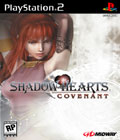Genre: RPG
Developer: Sacnoth
Publisher: Midway
Release Date: September 27, 2004
Pre-order 'SHADOW HEARTS: Covenant': PlayStation 2
Have you ever wondered what happens to your characters in an RPG, which you've painstakingly and lovingly built up, after the end of the game when they've defeated a god? After Shadow Hearts, they were placed upon a pedestal, to be worshipped, blamed ... and have a huge bull's-eye painted on their asses.
Yuri, the smart-mouthed protagonist from the first Shadow Hearts, is back, severely faded from his former glory, with a new set of companions to begin a new epic quest.
Shadow Hearts: Covenant retains the 'mechanical' feel of the previous game. Keeping the Judgment Ring, a circle of which fields are sectioned off and an indicator bar sweeps the field, to confirm various combat actions, but the additions and flexibility have made it even more addictive than the first. Before it was restrictive, complicated, and expensive to adjust the Judgment Ring to a more powerful and still useable form, but now it only depends on how carefully you comb through the premises (a mini-map is provided) and how accurate you are on a consistent basis when using the ring. There are still the items that customize the ring to make it more powerful, but instead of a maximum of three hits, the limitation is only upon you, not the game.
Though Covenant is running a new engine for its combat and many additions and changes have been made, it's still a turn-based system.
For example, Covenant creates a more team-oriented unity between the protagonists, in a way that the first game didn't. You can perform combo attacks, and the better the affiliation between the characters in the combo, the easier it'll be to perform the attacks. This is also influenced by the combat field, which is more three-dimensional than the first game. In Shadow Hearts, the combat field was a traditional lineup; here, combat takes place in an open area, kind of like a real combat situation, where positioning actually matters. I'm happy that there is an indication of who is going next in a fight, so I can plan accordingly.
Unlike Shadow Hearts, Covenant allows you to customize what magic is available to what character, as well as when abilities are gained by certain characters. In the first game, there was a set ability category and ordered leveling. In Covenant, characters still have an elemental affinity, a type of magic that they are innately effective, but they can cast whatever magic is supplied by the Crests that they have equipped. A character with an affinity for darkness can cast Cure; they're just not as good at it as a character with an affinity for light would be.
The only blemish is the graveyard in Yuri's soul, as it's very different. In Shadow Hearts, Yuri fought for his very soul in that graveyard; in Covenant, I feel like I am in Onimusha, but instead of orbs, I am regaining Yuri's ability to transform into various demons, the rare ability of fusion. (I have enough souls collected now. I am going to power up.) Truthfully, in the first game, it was a pain to find monsters that would give you a particular affinity of demon-soul, because in some areas, the type of monster just wasn't there. Now the only thing that determines which fusions you have access to is how many souls you have collected.
Covenant really impressed me with its graphic quality and voice acting. The first had a wealth of cut scenes, but there were extremely few FMVs (full motion videos) and little voice acting. In Covenant, these are both numerous and beautiful.
Overall, with the improved graphics, voice acting, actual FMVs, and a system overhaul, I am awed by the improvements and inventiveness that Aruze applied to Shadow Hearts: Covenant. I recommend this to anyone because of the smoothness of system and plot; neither stops the other from making a fantastic mix of a game.
More articles about Shadow Hearts: Covenant














































